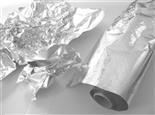
Background Information:
Aluminium is the most abundant metal in the earth’s crust, and the third most abundant element after oxygen and silicone.
Aluminium is too reactive to occur as a free metal and is instead found combined in over 270 different minerals.
Properties:
Aluminium is a light weight ductile material that has a high resistance to corrosion and has good thermal and electrical conducting qualitys.
Because aluminium is easily malleable it is often combined with other metals to produce an alloy that has a high ductile strength, while retaining aluminium's other useful properties.
Uses:
Due to it’s unique properties aluminium is used in many different applications.
Such as:
- Packaging (Chocolate bar wrappers, crisp packets).
- A wide range of household items (Aluminium foil, bike frames, cooking untensils).
- Consumer electronics (Mobile phones, CD’s ,computer hardware).
- Construction (Ladders, wiring, tools, batteries).
Recycling:
Aluminium is 100% recyclable without any loss of its natural properties.
Recycling aluminium saves 95% of the energy it would of needed to produce the same amount of aluminium from virgin material. This is because it has to undergo less treatment and processing, to get a similar standard of material.
Metallised plastic films (such as chocolate bar wrappers and crisp packets) should not to be collected for recycling with aluminium foil, as they contain plastic and aluminium. Therefore they need different sorting and processing treatments before they can be recycled.
To check if it is metallised plastic film, scrunch the material in your hand. If it springs back to its original shape then it is likely that it contains plastic.
Energy Recovery:
Where recycling is not a viable option energy recovery through incineration can produce useful electricity and stop the material from going to landfill.
1kg of incinerated aluminium releases the same amount of energy as 1kg of coal or 0.8 litres of fuel.
Charity’s And Community Groups:
Charities and community groups sometimes collect aluminium foil for recycling. You should check with local centres and nurseries to see if they can find a use for the material.
Foil and cans can often be sold to cash for cans centres for around 30p per kg. Saving and recycling aluminium in this way is only cost effective if you wait until you have larger amounts, so fewer trips in the car are needed.
Aluminium foil should only be placed in can banks if there are specific marks on the bank to indicate it can be recycled there. Foil and cans must be kept separate as they are made from slightly different alloys and are therefore must be recycled separately.
Aluminium Facts:
- The average annual consumption of recyclable aluminium foil is 1.1 kg per household
- World wide over 50% of aluminium is recycled
- The energy saved by recycling 0.5kg of aluminium foil is enough to run a TV for 3 hours
- Most recycled aluminium foil is used to make cylinder heads and engine blocks for the car industry